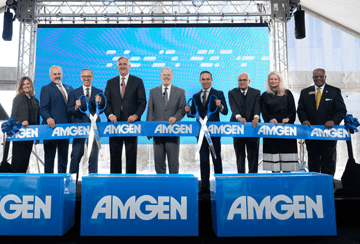In a major advancement for rare disease treatment and regulatory medicine, the U.S. Food and Drug Administration (FDA) has approved the expanded use of Amgen’s Uplizna (inebilizumab) as the first authorized therapy for Immunoglobulin G4-related disease (IgG4-RD). This milestone solidifies Uplizna’s status as a pioneering treatment option within the growing field of immunological drug innovation and regulatory therapeutics.
IgG4-RD is a chronic autoimmune condition marked by excessive immune system activity, causing inflammation and fibrosis in vital organs such as the liver, pancreas, and kidneys. Affecting an estimated 20,000 people in the U.S., the disease has long lacked targeted, FDA-approved therapies—until now.
Targeted Treatment with Regulatory Confidence
Administered via infusion, Uplizna works by binding to a B-cell surface protein, targeting one of the key cellular drivers behind inflammatory activity in autoimmune disorders. According to Jay Bradner, Amgen’s Head of R&D, the drug’s mechanism offers a potent regulatory benefit by systematically depleting B cells both in the bloodstream and affected tissues.
“By removing these B cells, Uplizna provides an opportunity to fundamentally reduce immune-driven damage,” said Bradner.
The regulatory greenlight was granted following robust data from a late-stage clinical trial, which demonstrated that Uplizna reduced flare risks by 87% compared to placebo, a result hailed by industry analysts as both safe and highly effective.
Regulatory Milestone and Market Outlook
Amgen has set the U.S. list price for Uplizna at $140,248.50 per dose, with treatment consisting of two initial loading infusions, followed by biannual maintenance infusions. While the cost highlights ongoing challenges in pharmaceutical pricing governance and patient access, the long-term value may offset costs typically incurred by the use of steroids, which are associated with adverse effects like mood swings, weight gain, and osteoporosis.
“The goal with treatments like Uplizna is to reduce steroid reliance, and this approval is a step toward that objective,” noted Dr. Matthew Baker, Associate Division Chief of Immunology and Rheumatology at Stanford University.
Analyst Yaron Werber of TD Cowen projects that Uplizna could reach peak global sales of $1.3 billion by 2030 for IgG4-RD alone, reflecting strong market confidence in its regulatory approval, clinical safety profile, and commercial scalability.
Uplizna had already received regulatory approval for neuromyelitis optica spectrum disorder, another severe autoimmune disease, contributing $379 million in global revenue in 2024.
Driving Innovation in Regulatory Healthcare
This FDA approval underscores the critical role of compliance-driven pharmaceutical development and regulatory frameworks in accelerating innovation for underserved patient populations. As health systems strive to balance affordability, access, and innovation, drugs like Uplizna highlight the potential for risk-mitigated, data-backed solutions in modern healthcare delivery.
The development also reflects a broader trend toward precision immunology, where regulatory enforcement and compliance analytics guide safe, targeted interventions for rare diseases with high unmet medical needs.




